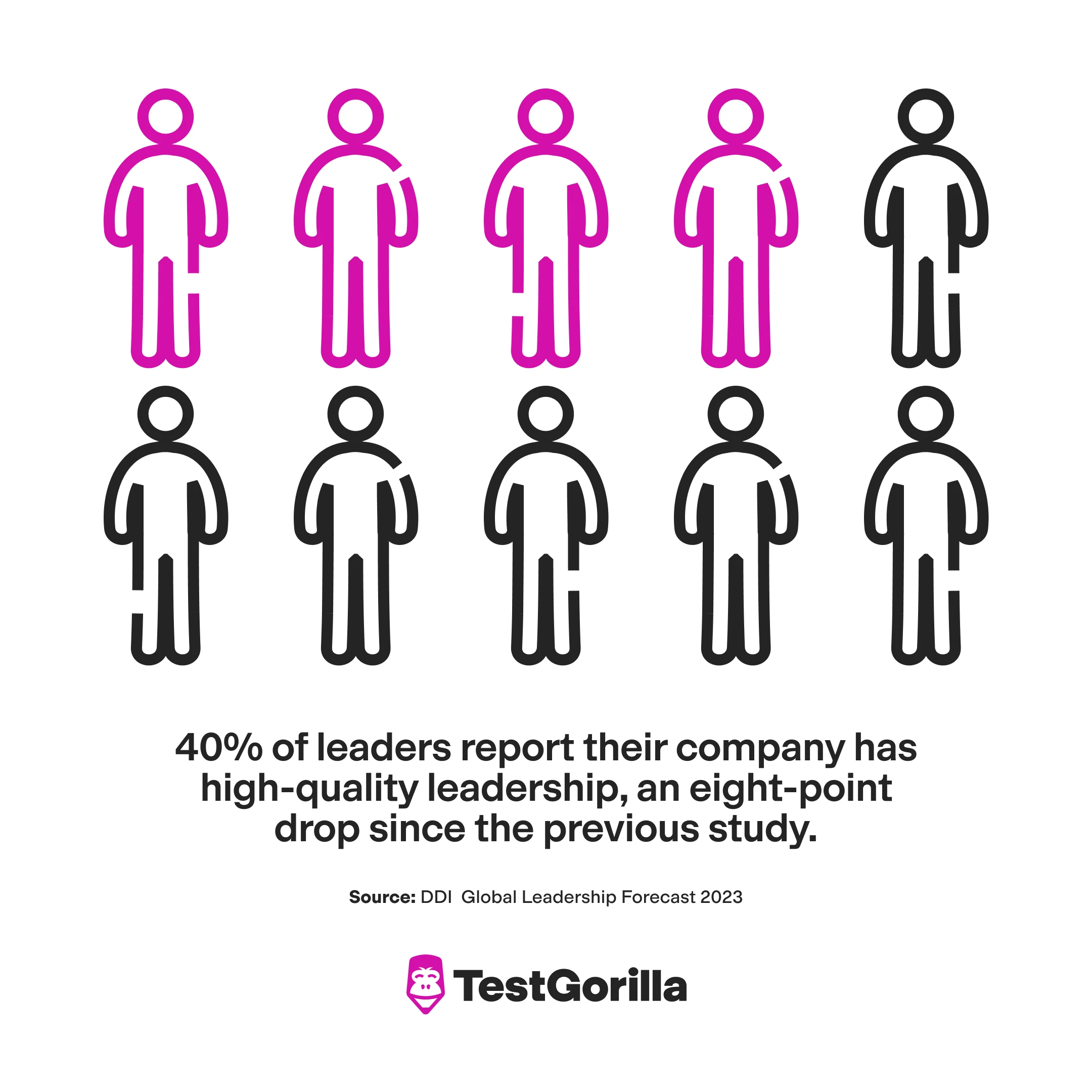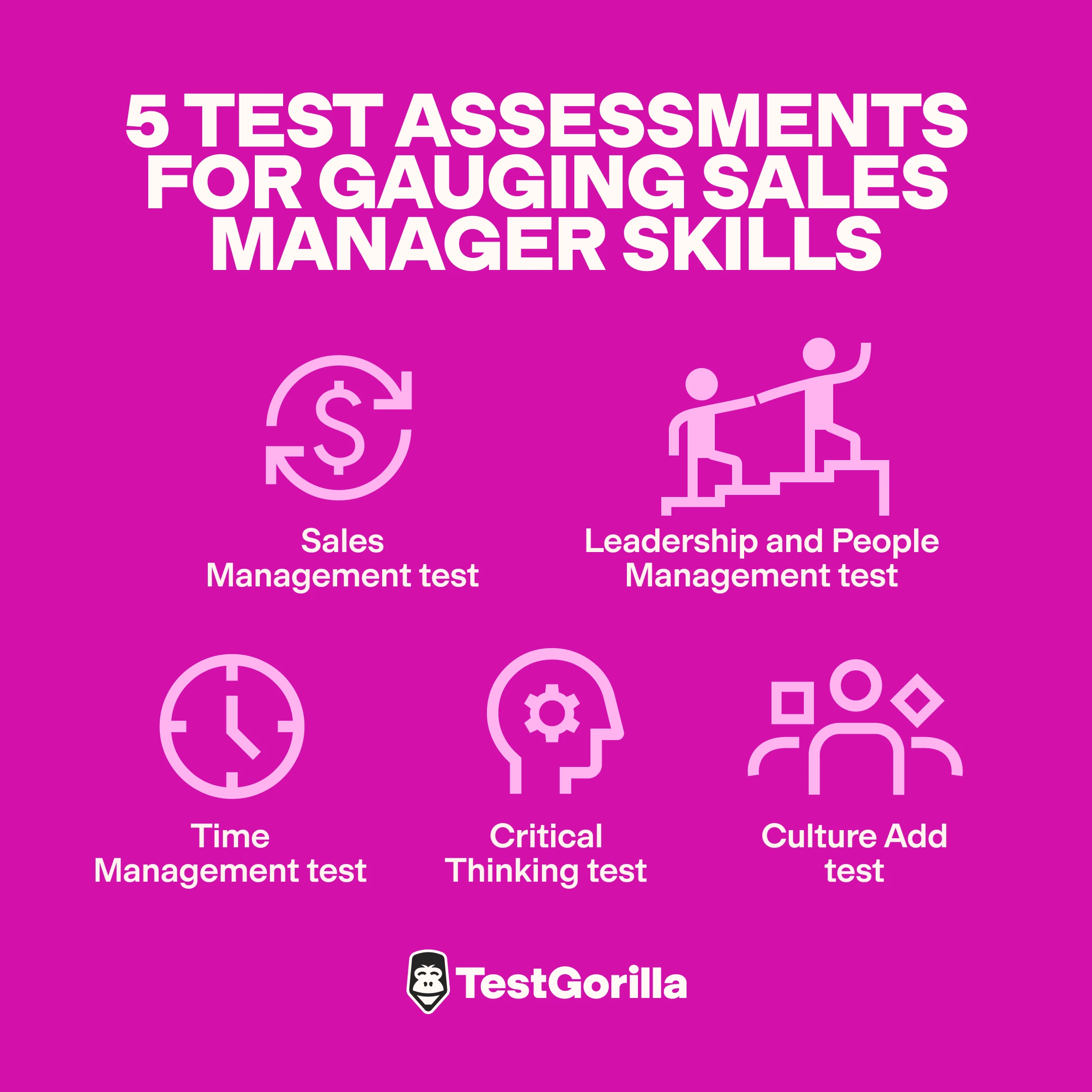Sales manager job description: Key skills and traits
Find top sales managers with talent assessments
Finding the right person to lead your sales team – those directly responsible for generating revenue for your company – is no small feat.
Your sales manager drives new business, manages key relationships, and trains the sales team to achieve the best outcomes. You can’t afford to make a bad hire.
Hiring the best person for the job starts by identifying the right sales manager skills and compiling them into a comprehensive job description.
This guide helps you craft the best sales manager job description to attract top talent and provides an overview of the key skills for sales managers.
Table of contents
- What does a sales manager do?
- 12 key skills to look for in a sales manager
- How to write an effective sales manager job description
- Sales manager job description template
- Next steps: Attract and assess sales managers with TestGorilla
- Assess and hire the best with a winning sales manager job description
- Sales manager job description FAQs
What does a sales manager do?
Sales managers oversee the primary elements of a company’s sales activities and direct and influence the sales staff in a sales team. Their main responsibilities include strategizing and planning, setting sales goals, and hiring, training, and mentoring sales agents.
This role has a direct impact on your company’s profits in more ways than one. In addition to influencing product sales, these professionals also promote better profitability and collaborate with and support their staff.
When companies increase their amount of talented managers and engaged employees, they achieve, on average, 147% higher earnings per share than the competition.
What is a sales manager's salary typically? The average is wide: between $66k and $120k for base pay and between $118k to $217 considering additional performance-related pay.
12 key skills to look for in a sales manager
A great sales manager’s job description starts with the skills. Any qualifications you list boil down to hard skills, soft skills, personality traits, and competencies.
Adobe’s Leadership Development study ranked the following five skills as essential for sales professionals:
Coaching and development skills
Communication skills
Leadership skills
Emotional intelligence
Strategy development
In addition, a sales manager must also understand marketing strategies and work with the marketing manager to evaluate sales territories, pricing strategies, and other metrics.
Not enough people think about skills, opting to focus on work history and degrees instead. Unfortunately, only 40% of leaders report their company has high-quality leadership, an eight-point drop since the previous study.
Let’s examine the key hard and soft skills for sales managers to enhance leadership in your company.
Sales manager hard skills
Let's take a look at the top hard skills to include in your sales manager job description:
Hard skill | Description |
Strategic sales planning | Developing a clear sales plan for salespeople that details processes, budgets, scripts, templates, and ongoing sales training |
Forecasting and analyzing | Creating in-depth reports that predict how well the team and company performs weekly, monthly, quarterly, or annually |
Delegation | Knowing when to delegate a task, who to delegate it to, and when to do it personally |
Performance management | Monitoring teams and comparing their results with the company goals, as well as understanding market insights, reading and creating sales forecasts, and developing sales strategies |
Recruiting and mentoring | Understanding what a team needs and how to improve their skills, as well as identifying how to ramp up recruits |
Technology literacy | Understanding how to seamlessly use essential sales software, including customer relationship management (CRM) systems and sales performance management (SPM) software |
Sales manager soft skills
Here are the most important soft skills to consider when reviewing your sales manager job description and responsibilities.
Soft skills | Description |
Leadership and problem-solving | Empowering and motivating sales teams, taking the initiative, and guiding teams to reach the best outcomes |
Communication | Excellent communication and interpersonal skills in different contexts and mediums are key, alongside active listening and empathy |
Negotiation and customer service skills | Controlling and driving discussions, effecting positive outcomes, and handling a variety of potentially high-pressure situations |
Organization | Maintaining organization and balancing multiple tasks such as forecasting, planning, and coaching their team |
Critical thinking and analytical skills | Using logic and research to analyze a problem and create well-thought-out solutions |
Motivation | Using leadership and communication to bring out the best in their group and its selling capabilities |
How to write an effective sales manager job description
Here are four best practices to remember when writing an effective job description and hiring sales managers with all the skills and no frills.
1. Introduce your company (and culture)
Clarifying your culture is essential to attract the right people. Managers shape and spread your culture through motivation and team strategies, so they must share your core values.
Make sure your “about us” section outlines your company’s mission, goals, sector or industry, and culture and ideals.
For example:
As a rapidly growing international company, we work tirelessly to give customers the best shopping experiences possible.
We aim to apply the quality and innovation embedded in our everyday work lives to set new standards and take the lead in the market. As a global business operating in diverse markets, we are committed to attracting, developing, and retaining talent that reflects the communities we serve.
2. Give a brief but descriptive overview of the role
No two businesses have the same needs, and no two sales manager positions are the same. Concisely describe your sales manager job description and duties. Include key responsibilities, but be concise.
For example, a retail sales manager job description could include:
We are looking for an outstanding retail sales manager to help set visual standards, drive sales quotas, and coach associates on merchandising best practices.
This role handles floor and inventory management, leads a team of 15 sales associates, and helps us develop our overall merchandising and brand strategy.
3. Focus on the right skills
Sales manager job requirements should be the main focus of your job description, but we don’t recommend the usual emphasis on college degrees and work experience.
Identify the sales and management skills your role needs and build your job description around them. If your ideal candidate needs to be a Hubspot CRM whizz with keen outside sales abilities, put them front and center to encourage relevant, high-quality talent to apply.
Skills-based hiring is all about putting the most important qualities first. Other qualifications, like years of experience, only come second.
Discover the power of skills-based hiring in our product tour
4. Clarify tasks and responsibilities
Sales manager roles and responsibilities differ significantly from company to company, so take your time clarifying them. Candidates must know precisely what the role entails before applying, including day-to-day life and any unusual or unique duties.
If you’re a fast-paced organization with shifting needs and priorities, consider listing outcomes rather than specific responsibilities to show applicants what you expect from the role, even if the responsibilities change. Doing so increases engagement and retention.
Sales manager job description template
Our sales manager job description makes posting an effective job ad quick and easy. Keep this template on hand and fill in the blanks to streamline your recruitment process.
After posting your job description, use our full guide to learn how to hire a sales manager.
Sales manager job description: Company introduction
Here, introduce your company and its purpose, values, and mission. Describe its products and services and how your sales managers contribute to its success.
Benefits of working with [your company]
Discuss the benefits of working for your company, including unlimited PTO, learning and development opportunities, and flexible work.
Don’t forget benefits that may be specific to sales managers, including special stock plans, profit-sharing programs, and commissions.
Sales manager job brief
[Company Name]
Job Title: [Sales manager / Retail sales manager]
Reports to: [Sales director, head of sales, managing director]
Position Type: [Full-time, part-time, or contract]
Location: [On-site, remote, or hybrid]
[Salary and benefits information]
Sales manager responsibilities and duties
Create sales plans that align with company goals
Hire new sales team members, identifying their needs, and helping them ramp up
Analyze sales data and performance to spot opportunities for further growth and employee development
Provide training and coaching
Conduct regular sales forecasts to inform sales strategies
Analyze customer satisfaction reports to understand customer needs and enhance sales representative performance
Outline and adopt effective sales strategies and monitor their progress
Sales manager qualifications and skills
A strong sales manager job scope includes the following skills and competencies:
Required skills and experience
Expert proficiency in at least one customer relationship management (CRM) system
Intermediate Google Workspace skills
Strong verbal and written communication skills
Proven ability to meet sales targets
Committed to continuous learning through courses, seminars, and workshops
Strong ability to direct the sales process from planning to closing
Preferred skills and experience
Public speaking skills
Three years of sales experience in a management role, leading a sales department or team
An associate’s or bachelor’s degree in business administration or a related field
History of exceeding sales targets
Next steps: Attract and assess sales managers with TestGorilla
You’ve written and polished your sales manager job description – it describes the top skills of a sales manager and your company’s specific responsibilities, and it’s ready to attract qualified candidates.
The next step is hiring the best people with talent assessments.
Resumes only give you the job seeker’s opinion of themselves. Talent assessments evaluate what counts: skills, competencies, and personality traits.
Testing a candidate’s skills gives you hard evidence of whether or not they can do the job before day one. Here’s an example of five test assessments for gauging sales manager skills:
Sales Management test
Leadership and People Management test
Time Management test
Critical Thinking test
Culture Add test
Multi-measure testing gauges the holistic candidate, including hard and soft skills and cultural alignment. Let’s take a closer look at some of the tests.
The Sales Management test examines critical criteria for B2B sales managers in manufacturing and software services. It gauges essential sales management competencies, including:
Leadership capabilities
Sales strategies
Sale incentives
Territory management
See more examples by checking out our sample questions.
A candidate with these abilities can effectively manage their team and grow the company. They know how to build and maintain top-tier teams and plan for and achieve business goals.
Our Leadership & People Management test assesses how a candidate influences and guides others. It discovers people who excel at supporting and developing others.
This test also evaluates a candidate’s ability to delegate tasks, create development plans, provide expert feedback, and increase acceptance of new ideas and strategies.
However, these tests are only the tip of the iceberg. Check out our collection of sales director tests to build an assessment that suits your company.
Talent assessments are a reliable, repeatable recruitment strategy that enables you to hire the best on the first try. 81% of employers reduce time-to-hire when they switch to skills-based hiring, and 78% reduce cost-to-hire (Source: The State of Skills-Based Hiring).
Once you shortlist your candidates and narrow down your talent pool, use our sales manager interview questions to understand their abilities in depth.
Assess and hire the best with a winning sales manager job description
Even the best sales manager job descriptions attract unsuitable applicants, so you must combine them with talent assessments to gauge candidates.
Role-specific tests, soft skills tests, and personality tests help you filter out unqualified applicants so you can focus on top talent.
Ranking each applicant by their sales manager skills saves you from sifting through hundreds of resumes just to find a handful of potential hires. It streamlines the hiring process from the beginning, enabling you to hire and onboard the perfect candidate quicker than ever.
Book a demo with one of our experts to learn how to use talent assessments when hiring a sales manager.
Alternatively, take a stroll through our product tour to understand how to fit talent assessments into your recruitment strategy.
Sign up for a Free Forever Plan if you want to learn with a hands-on approach!
Sales manager job description FAQs
Let’s finish up by answering a few questions about the sales manager job scope.
Why are sales manager skills important?
Sales managers directly communicate with clients, employees, and new recruits. They need charisma, negotiation skills, and good people management skills to execute sales strategies effectively and assist employee development. The sales manager is also responsible for coaching and motivating employees to make more sales. The key skills of a sales manager create a team that makes more sales, brings in more clients, and recruits new employees that meet this standard.
Without this combination of people skills and goal-oriented thinking, your sales team can’t hit their targets, and the company struggles to reach its short or long-term goals.
What is the key strength of sales managers?
Key sales manager skills include leadership, communication, and active listening. Sales managers need strong interpersonal and soft skills to communicate effectively with team members and clients. These communication skills also help them build strategies that align with your company’s goals. What about hard skills? What is a sales manager’s single most desirable hard skill? Sales managers need to be highly competent in at least one CRM system, such as Salesforce or Hubspot, so be sure to include a Salesforce CRM skills test in the hiring process.
Who makes a good sales manager?
People with a track record of confidence and empathy have the right balance of emotional intelligence and determination to understand their team’s needs and execute new strategies. A great sales manager must listen to their sales representatives and help them achieve their goals. They also need the strength and confidence to negotiate sales and carry out company missions.
Related posts
Hire the best candidates with TestGorilla
Create pre-employment assessments in minutes to screen candidates, save time, and hire the best talent.
Latest posts
The best advice in pre-employment testing, in your inbox.
No spam. Unsubscribe at any time.

Hire the best. No bias. No stress.
Our screening tests identify the best candidates and make your hiring decisions faster, easier, and bias-free.
Free resources
This checklist covers key features you should look for when choosing a skills testing platform
This resource will help you develop an onboarding checklist for new hires.
How to assess your candidates' attention to detail.
Learn how to get human resources certified through HRCI or SHRM.
Learn how you can improve the level of talent at your company.
Learn how CapitalT reduced hiring bias with online skills assessments.
Learn how to make the resume process more efficient and more effective.
Improve your hiring strategy with these 7 critical recruitment metrics.
Learn how Sukhi decreased time spent reviewing resumes by 83%!
Hire more efficiently with these hacks that 99% of recruiters aren't using.
Make a business case for diversity and inclusion initiatives with this data.

























